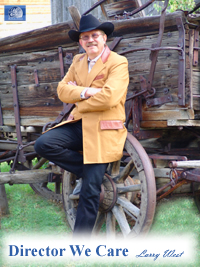
 |
|||||
![]()
 |
“The warriors were running around getting ready.” That’s what Florence Whiteman says, telling the Indian side of what happened at Little Bighorn that famous day, June 25, back in 1876. Florence Whiteman was raised by her grandparents. She is today “the last woman warrior among the Northern Cheyennes.” Her grandfather was Louis Dog, a hundred years old when he died. “After the Custer battle,” she says, her grandfather, Ho-ta Me-he, or “dog” in Cheyenne, joined the U.S. Army as a scout.” As she grew up, he told her many stories about the famous battle. And relating his stories, she says that, on that day, as the warriors were running around getting ready for battle, “a man got up and took his drum and began singing.” These are her words: “He was singing the Suicide Song.” And then she explained. “And all these warriors who were getting ready, they were putting on their best moccasins, so that they could die in their best. They were getting their horses ready too. They came running to this man who was playing the Suicide Song. They began dancing to the song. If you dance to that Suicide Song, it means you must stay out there to the very end, because you have made a vow to win or die. That’s the purpose of the Suicide Song.”Courage’s aggressive nature was inherent among the Indian people of yesteryear. In Indian warfare it was called “counting coup” (a French word). It was “to touch the enemy.” Such a term was not to exterminate the enemy and then control his territory and society. True, it was to kill the enemy, but it was also to injure him, struggle with him or merely touch him. It was an act of bravery. Only then could the warrior become famous or even someday a renowned chief.The Christian’s “counting coup” too is to struggle with the enemy, Satan and his forces. Now, ours is not to become famous, but simply to rescue man, then turn him over to our Leader and let Him control all territories. It remains an act of bravery, yes, but it is one of total surrender, giving God the glory, increasing His fame in both Heaven and earth as the already-existing “renowned Chief!”How oft we forget in this thing called Christianity that there is battle engaged. It is not Country Club, this thing called discipleship. It is not “lodge,” “Habit,” or “mass,” as it now and again appears among too many who claim “followers.” It is war. And it is for survival. The mission is SAR, Search And Rescue. And our “Chief” is saying to His warriors even today, “Win or die” (Romans 12:1-2). And how we’ve acted determines what we’ve become. When we spend our days meeting and eating, playing … and straying … we forget who we are and to Whom we belong. And we need one another to remind ourselves. “Provoking one another,” the Hebrew writer says, “unto love and good works” (Hebrews 10:24). Christianity is a movement, not a monument. And our good works, our “movement” is assigned: Be aggressive against the enemy. And do it, laying your lives on the line (Mark 16:15-16; Matthew 10:37-40).Now, sometimes the only defense is the aggressive offense. It was the Hunkpapas and Oglalas of the Lakota nation who sided with the Cheyennes against Custer and the seventh, along with the white man’s scouts, about 29 of them, from the Crow and Cherecara nations, at Little Bighorn. I like what Low Dog, of the Oglala tribe of the Lakota nation, said. “They came on us like a thunderbolt …. We retreated until our men got all together, and then we charged upon them. I called to my men, ‘This is a good day to die: follow me.’ We massed our men, and that no man should fall back, every man whipped another man’s horse and we rushed right upon them.”
Indeed, there are all kinds of applications in his charge, and not his only, but in Florence Whiteman’s words. May God’s people today learn to whip, not one another, but rather “every man another man’s horse” as we charge together into battle for the souls of men. We have come to stay to the very end because we have made a vow to win or die. For when we came to Christ, yes, we came to dance the Suicide Song.